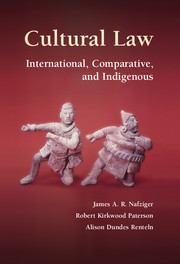Book contents
- Frontmatter
- Contents
- Preface
- Acknowledgments
- 1 Cultural Law: An Introduction
- 2 Culture and Law: The Basics
- 3 Cultural Heritage Law: Introduction
- 4 Cultural Material: Protection and Cooperation
- 5 Cultural Material: Rectification, Criminal Justice, and Dispute Resolution
- 6 Intangible Cultural Heritage
- 7 Museums
- 8 Sports
- 9 Religion
- 10 Language and Linguistic Expression
- Index
- References
3 - Cultural Heritage Law: Introduction
Published online by Cambridge University Press: 05 June 2012
- Frontmatter
- Contents
- Preface
- Acknowledgments
- 1 Cultural Law: An Introduction
- 2 Culture and Law: The Basics
- 3 Cultural Heritage Law: Introduction
- 4 Cultural Material: Protection and Cooperation
- 5 Cultural Material: Rectification, Criminal Justice, and Dispute Resolution
- 6 Intangible Cultural Heritage
- 7 Museums
- 8 Sports
- 9 Religion
- 10 Language and Linguistic Expression
- Index
- References
Summary
The Definitional Framework
Broadly speaking, the term “cultural heritage” refers to all of the myriad manifestations of culture that human beings have inherited from their forebears. These manifestations include, for example, art, architecture, rural and urban landscapes, crafts, music, language, literature, film, documentary and digital records, folklore and oral history, culinary traditions, traditional medicine, ceremonies and rituals, religion, sports and games, recreational practices such as hunting and fishing, and dance and other performing arts. In a narrower sense, however, the term “cultural heritage” is often limited to tangible or material objects – essentially, cultural material or objects – and intangible ideas related to such objects. We commonly associate this narrower definition with the legal concept of property whether we are referring to physical or intellectual property. Accordingly, the terms “cultural property” and “cultural heritage” sometimes are used interchangeably. Strictly speaking, however, the term “property” connotes ownership and imputes rights to owners and possessors of objects.
The multiple meanings of the term “cultural heritage” may lead to confusion, as is apparent in diverse efforts not only to protect culture itself but also to enhance its meaning in people's lives. Difficult questions arise that may challenge presumed values. Take three examples.
- Type
- Chapter
- Information
- Cultural LawInternational, Comparative, and Indigenous, pp. 206 - 251Publisher: Cambridge University PressPrint publication year: 2010



